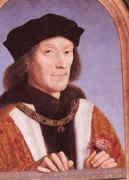Henry VII is also known as Henry Tudor. He was the first Tudor king after defeating Richard III at the Battle of Bosworth in August 1485. This battle saw the end of the Wars of the Roses which had brought instability to England. Henry VII was king of England from 1485 to 1509. His second son, also called Henry, inherited the throne and became Henry VIII. Henry VIII and Elizabeth I tend to dominate Tudor history and their lives do overshadow the importance of Henry VII’s reign.
|
|
The Wars of the Roses had been a constant battle between two of England’s most powerful families – the families of York and Lancaster. Henry was a member of the Lancaster family and to bring the families closer together he married Elizabeth of York soon after being crowned king.
However, the powerful York family remained a threat to him for years to come as they never recognised their defeat in the Wars of the Roses nor did they want a member of the Lancaster family as king of England.
However, Henry was a very difficult opponent. He was a clever man who was determined not to lose his throne. He quickly identified the main problem he faced – the powerful barons of England. They were rich and they had their own private armies. During the Wars of the Roses, they had not been loyal to either side – renting out their private armies to the family that paid the most. Henry had to control them.
Henry had a three-way plan to bring the barons under his control.
First, he banned all private armies. Any baron who disobeyed this royal command would be committing treason which carried the death penalty.
Secondly, he heavily taxed the barons to reduce their wealth. The money raised could be used by Henry to develop his own royal army. A powerful royal army was an obvious threat to the barons.
The third way of controlling the barons was to use the Court of Star Chamber. This was a court run by men who were loyal to Henry VII and they could be relied on to severely punish any baron who angered the king.
With these three potential punishments against them, the barons, though a threat to Henry VII, were reasonably well tamed by him.
Unlike many kings before him, Henry took a keen interest in financial matters as he knew that a wealthy king was a strong king and a poor king was a weak one. He also knew that money would expand his army and the larger his army was, the more powerful he was in the eyes of the barons. This alone, he believed would keep them loyal.
Though he was very careful with money, he also enjoyed himself. He was keen on playing cards. On January 8th, 1492, he put aside the large sum of £5 for an evening of gambling. We know that he lost £40 playing cards on June 30th, 1492. He regularly tipped those who entertained him – especially musicians – the sum of 33p – not much by our standards, but a good sum of money for an entertainer in Tudor times. He was also very keen on playing Real Tennis.
To develop better relations abroad, and to avoid costly foreign wars, he had arranged for his eldest son – Arthur – to marry a Spanish princess called Catherine of Aragon. Aragon is in north-east Spain. Such political marriages were common among the children of royal families. Neither Arthur nor Catherine would have had the opportunity to say no to the marriage.
The marriage lasted only five months as Arthur died. To maintain a friendship with Spain, Henry arranged for Catherine to marry his second son, Henry, the future king of England. Henry VII died before the marriage took place.
When he died in 1509, the country was by past standards wealthy and the position of the king was good. The barons by 1509 had been all but tamed. Many barons believed that it was better to work with the king than against such a powerful man.
Henry VIII inherited many advantages from his father’s reign as king. The reign of the Tudor family – 1485 to 1603 – is famous for many occurrences and two monarchs stand out (Henry VIII and Elizabeth I), but the 118 years of Tudor England has a great deal to thank Henry VII for as he got the Tudor family off to a stable and powerful start.
Related Posts
- Henry VII (king from 1485 to 1509) Control of barons ¯ ¯ Henry VIII (king from 1509 to 1547) Six Wives Reformation ¯ ¯ Edward…
